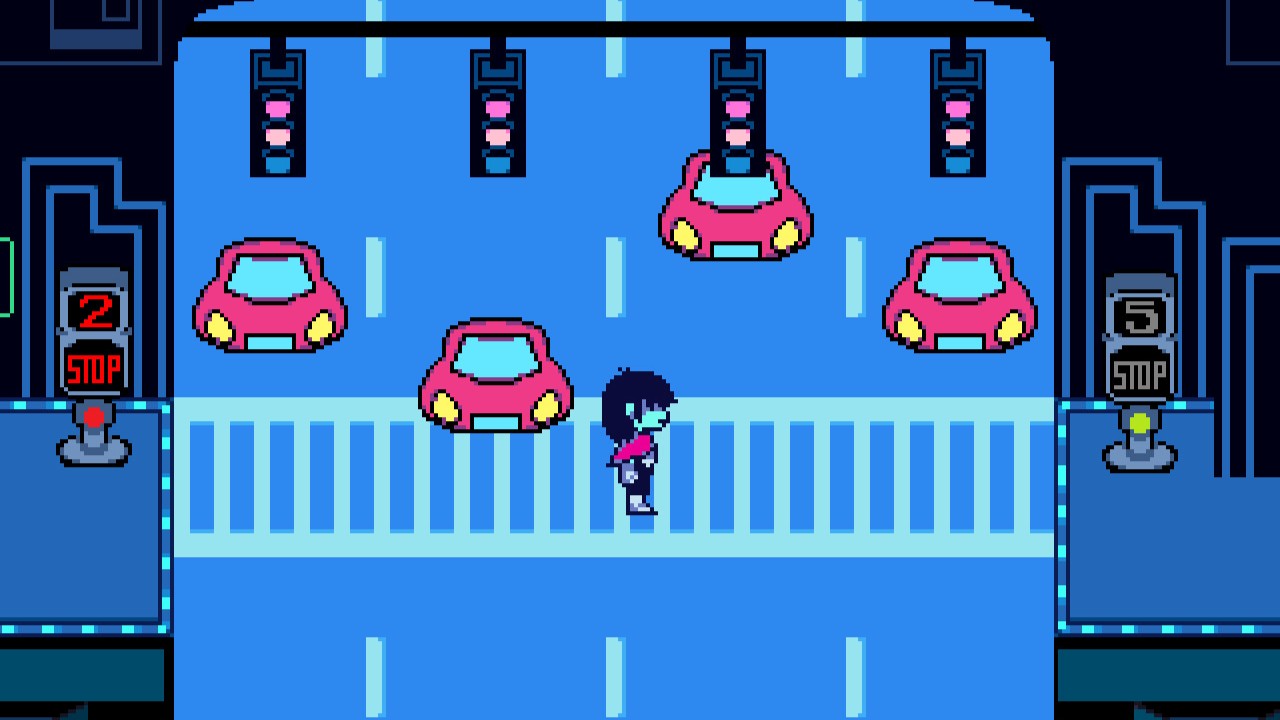TechRadar Verdict
Deltarune is a charming pixelated adventure that's not afraid to lean into the weird and wacky. This indie RPG flips the genre on its head, encouraging kindness over combat and delivering laughs in spades across its four chapters thanks to its witty writing, bizarre characters, and memorable worlds.
Pros
- +
Unique, personable characters
- +
Hilarious, off-the-wall writing
- +
Stunning chiptune soundtrack
- +
Surreal, atmospheric pixelated worlds
- +
Delve deeper into the story with each chapter
Cons
- -
Bullet Board can feel impossible to maneuver at times
- -
Encounters can be repetitive, especially in Chapter 1
Why you can trust TechRadar
Deltarune fans have been waiting over five years for the release of the third chapter in developer Toby Fox's role-playing game, but the wait is finally over. To coincide with the release of the Nintendo Switch 2, Fox has released not one but two more (of the seven total) chapters of the indie gem, with the four chapters releasing as a launch title for Nintendo's long-awaited console.
Platform reviewed: Nintendo Switch 2
Available on: Nintendo Switch 2, Nintendo Switch, PS5, PS4, PC
Release date: June 4, 2025 (June 5, 2025 for Nintendo Switch 2)
Both were well worth the wait. Fox's charming adventure is the perfect companion for the new console, offering a surreal, personable world (well, worlds) filled to the brim with memorable, chaotic characters, brilliant writing, and tons of heart. Undertale fans will find a lot of familiarity here.
But, thanks to the overhauled battle system, the addition of party members, and a cast of bizarre new (and returning) characters, Deltarune is as welcoming for new players as it is for long-time Fox fans.
After over 15 hours with Deltarune, I'm itching for more – to return to its bewitching world and the characters I've grown to love across its four chapters. The wait for the last three chapters, likely to be released one to two years apart, is going to be excruciating.
Wake up

Straight off the bat, Deltarune lets you know this is not a story you have much control over. You begin Chapter 1, creating your "vessel," choosing their arms, head, legs, and... uh... favorite blood type.
It feels a bit fishy, but hey, if it's anything like Undertale, I knew to be prepared for weirdness. And I was right. Upon finishing your character, it's discarded: "No one chooses who they are in this world," a mysterious voice tells you.
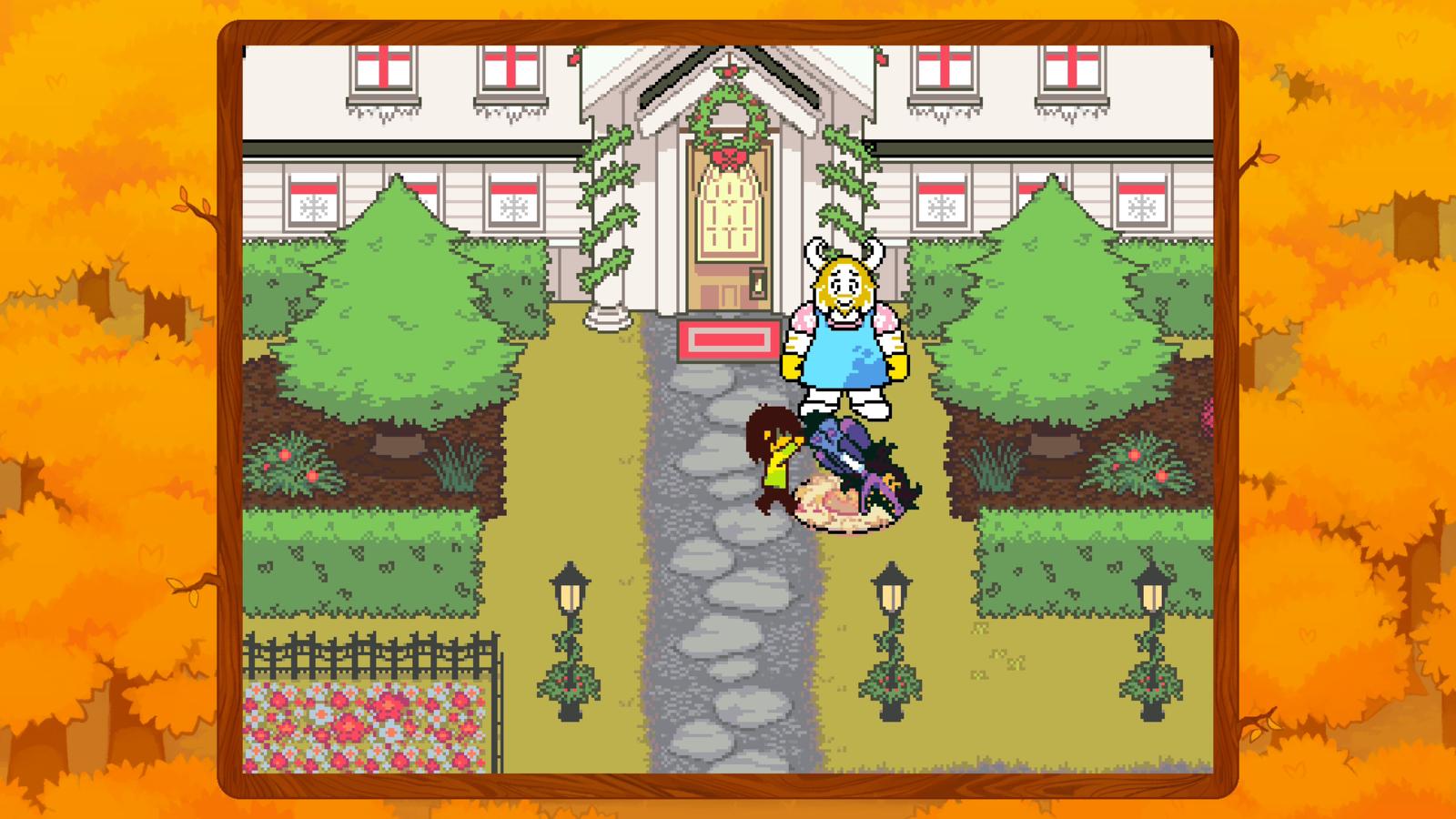
Those who played Undertale will find a lot of references to its universe in Deltarune. From characters like Toriel and Alphys to in-game item references (the sign in Kris' hallways says: "It's you") and even the name "Deltrarune" (an anagram of Undertale), there's a clear connection between the two worlds.
Instead, you're Kris, child of Undertale's Toriel, except the Undertale and Deltarune universes are not directly connected. They're parallel, with characters and references to Undertale appearing throughout Deltarune, but this Toriel is not the same as the one we knew.
Sign up for breaking news, reviews, opinion, top tech deals, and more.
This Toriel is Kris' doting mother, ushering him to school, where he's late. The punishment? Being teamed up for a group project with Susie, the class bully/badass monster. Sent on a mission by their teacher, Alphys, to find chalk (Susie ate it), the pair stumble across a closet that leads to the Dark World, where they meet adorable dork (and prince) Ralsei, who tells them they're part of a prophecy. Kris, Susie, and Ralsei are the Lightners, the heroes that will seal the Dark Fountains prophesied to destroy the world (both light and dark).
Across the three chapters, Susie, Ralsei, and Kris make their way through unique Dark Worlds to seal the fountains, meeting peculiar (and often hilarious) characters on their way and uncovering more about the link between the Dark and Light worlds.
Friend or foe?
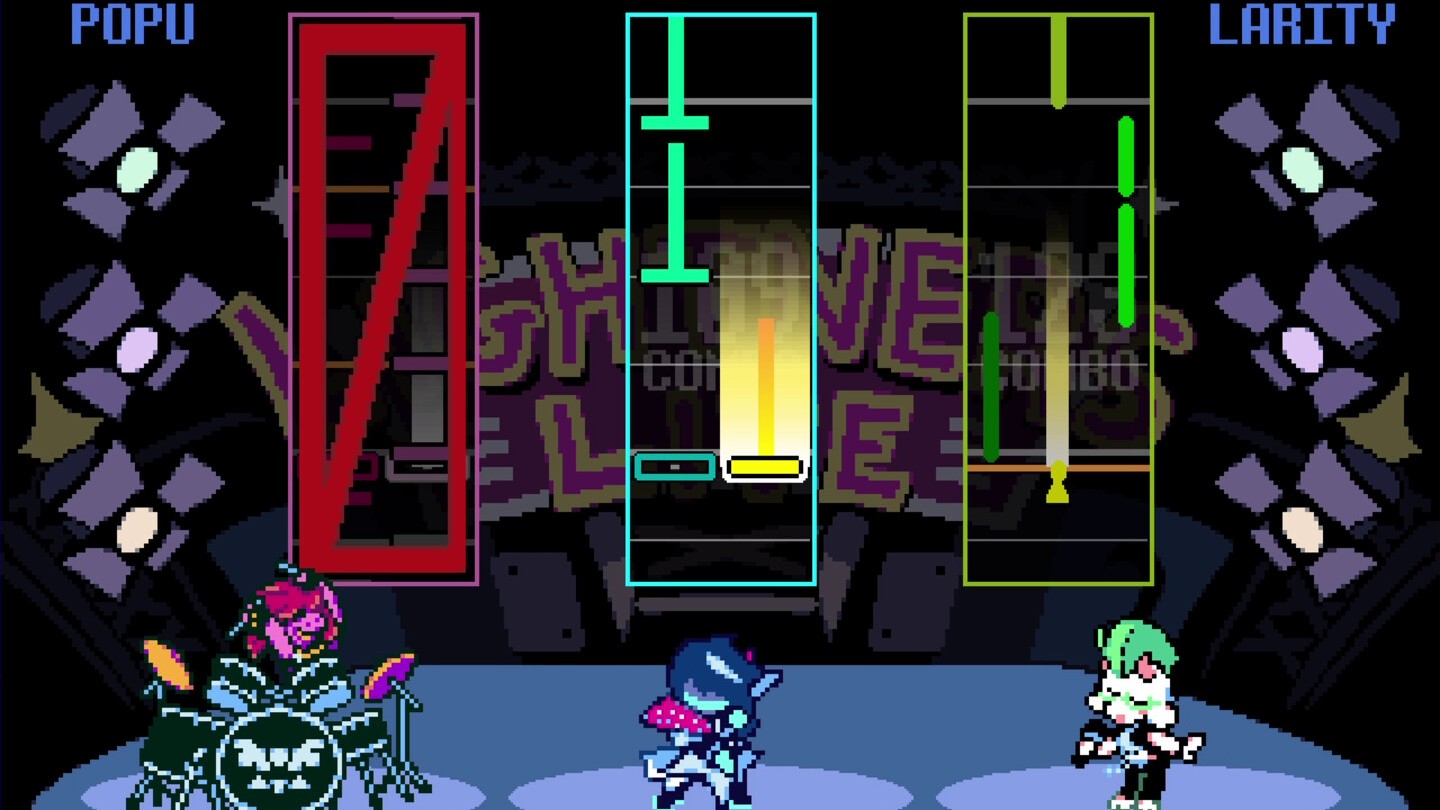
The juxtaposition between Deltarune's Light and Dark Worlds is palpable. The Light World is an idyllic town with a diner, hospital, school, library, and friendly animal-like inhabitants (some of which will be familiar faces to Undertale fans.) Once Kris and Susie enter the Dark World, however, things get much weirder.
Chapter one sees Kris, Susie, and now Ralsei facing off against perhaps the worst bad guy in history – and I don't mean that in a ‘he's so fearsome’ way. Lancer, the young son of a tyrant king, tries his best to intimidate the heroes but spectacularly fails again and again, eventually having to get help from Susie. The writing throughout Deltarune is laugh-out-loud funny, with each character bubbling with personality and acting in unpredictable, unique ways.
For example, grumpy Susie initially hates being a hero and tries to pummel any characters you encounter – regardless of whether you want her to. But, as Ralsei warns you early on, acts of kindness are the most profitable in this game. You're actively encouraged to show mercy to the weird and wonderful ‘enemies’ you encounter. "Nah," says Susie.
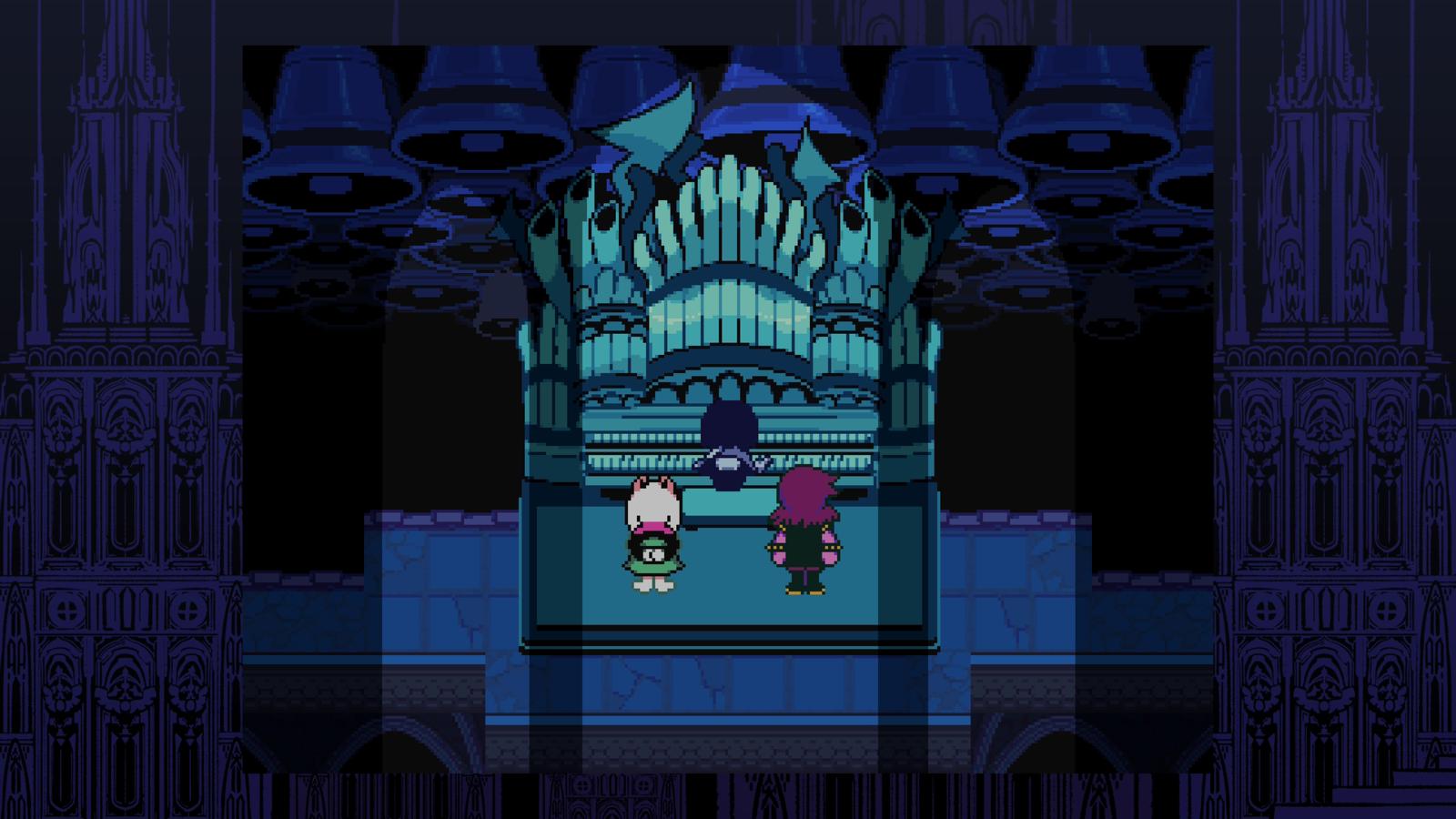
But, throughout the four chapters, you grow to love Susie as she gradually lowers her walls, learns to be a ‘good’ hero, and awkwardly courts her crush, school nerd Noelle. Likewise, all the returning characters develop through the four chapters, opening up about their backgrounds, insecurities, and more. So, by the end of chapter four, I felt I knew these characters. These bizarre animal-like creatures were friends, I knew how they'd likely respond to something, what they'd say, or how they were feeling in a situation. They felt like real friends – a feeling I've not had with a game before.
So much of that is down to the writing. While there's a lot of it, and an auto-play feature would be helpful rather than clicking a button after each paragraph, the writing manages to capture and present the personalities of every character you meet seamlessly – both friends and foes. It never feels shoehorned, either.
You want to know more about each and every character because they're so interesting and unique, and you know the unveiling will likely have you laughing out loud. That's why you're so taken off guard when an emotional beat hits, like Susie's realization that her Darkner friends, Ralsei and Lancer, can't just go to school with her in the Light World. A tough pill to swallow when her Light World reality is much lonelier.
Alongside the writing, it's the design of Deltarune's characters and world that brings this adventure to life. Across the chapters, you'll go toe-to-toe with water coolers, mice, flamboyant weather people, and a three-headed cat that loves trees, boys, and sports as you traverse various Dark Worlds. In the first chapter, you work through a forest-like setting, the second sees you navigating a cyber world, the third takes you to a TV World (where you're a contestant on a deadly game show), and the fourth sees you working through a church-like setting. These pixelated worlds are stunning, with their atmospheres further boosted by unique, chiptune soundtracks. I dare you not to feel good listening to the Cyber City World tune.
Each of these worlds has its own, eccentric boss that you can't help but love. The bosses in chapters one to three are all pretty bad at their jobs and encounters with them result in some of the game's funniest moments, like chapter two's Queen who is obsessed with her "Sweetie Honey Darling Gravy" Noelle, but continually hides from her adoring peon Berdly. It's absurd, and utterly brilliant.
Acts of kindness
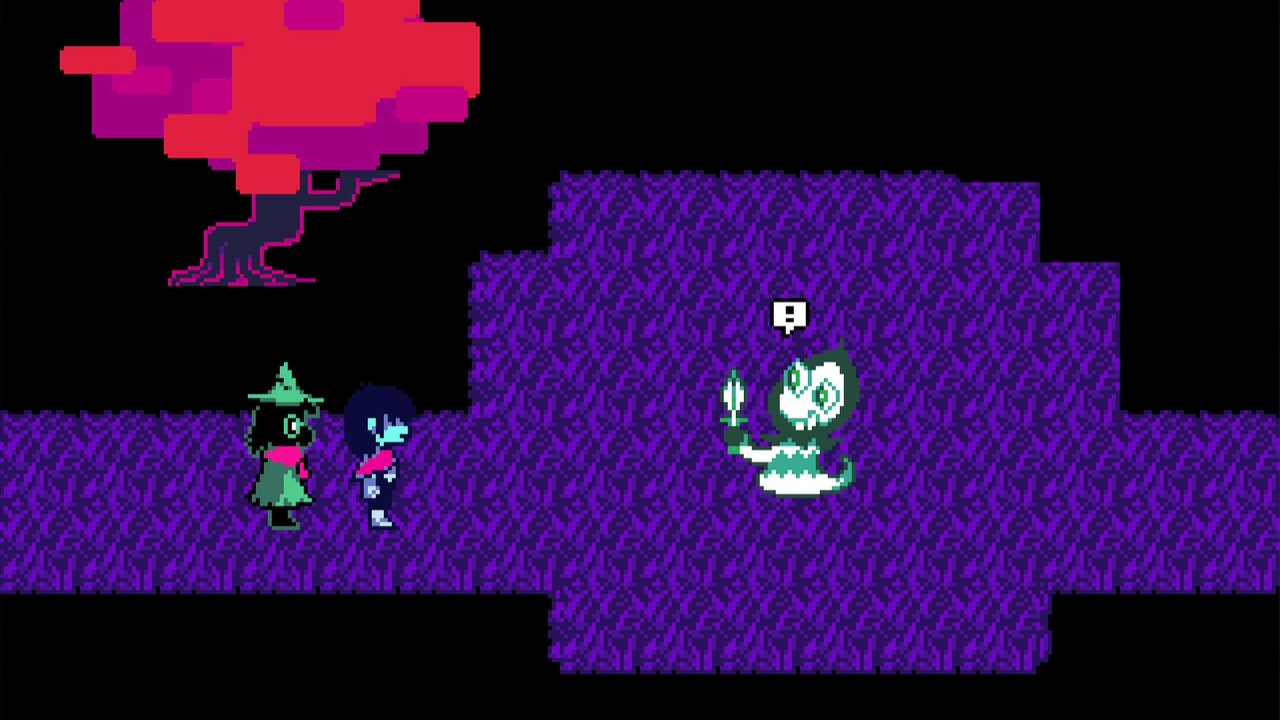
Ralsei's emphasis on acts of kindness is pivotal in Deltarune, because, unlike other RPGs, you are encouraged not to fight your opponents. This was a large part of Undertale's unique battle mechanics but is much more apparent here.
While Deltarune's encounters look similar to Undertale's and focus on turn-based combat, the battle system has been overhauled. Now, rather than fighting alone, you fight alongside your party members: Ralsei and Susie.
When you encounter an enemy, you're given several options: Fight, Act, Item, Spare, or Defend. While you can fight enemies, you ideally shouldn't. Not only is that because it's not quite in line with the game's ethos, but also because the foes you are kind to, and ultimately spare, can be recruited (officially in chapters two to four), with recruited allies helping you out in some way in the chapter's endgame. The recruited allies also move to Castle Town, your Dark World town base, with some building new shops you can take advantage of.
So, how do you win? Well, you kill them with kindness. By that, I mean, you use your turn to make each of your party members Act, which can involve flirting, talking, or complimenting your opponent, and increasing the Mercy meter of the enemy until they reach 100, allowing you to Spare and recruit them. Alternatively, you can tire them out and use Ralsei’s Pacify magic ability to spare them.
These enemies won't go easy on you during the encounter, however. They attack using the Bullet Board seen in Undertale. While in the Bullet Board, you must move around your soul (a heart icon) to avoid the enemy's bullet hell attacks. If you can Graze the bullets, and get close to them without getting hit, a white heart icon appears, and you gain TP (Tension Points) that allow you to use more powerful Acts and Magic.
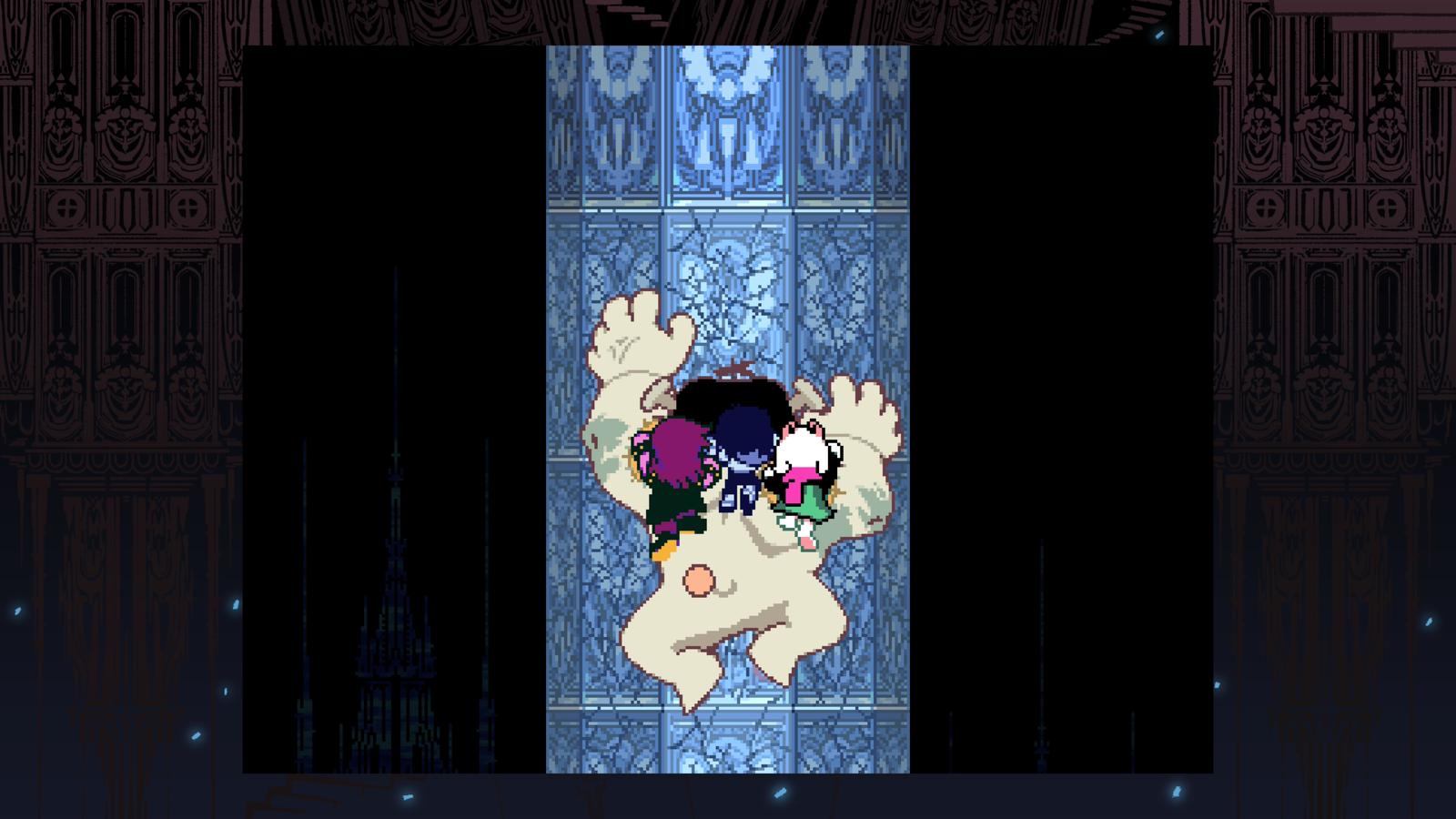
The Bullet Board can be hard to get to grips with. While you're encouraged to move bit by bit, avoiding the bullets can be near impossible at times – potentially because the Switch 2’s controls are less accurate than a mouse and keyboard. It's a frustrating mechanic that I disliked in Undertale, too, but a critical aspect of all encounters.
What I do like is the extra mini-games that can crop up in encounters, like an ability that requires you to catch the mouse to increase the mercy bar, or to "knock the socks" off an enemy by shooting its... socks.
In between turns, your opponent will likely say and do ridiculous things, which makes these encounters much more entertaining as, especially in chapter one, they can feel a bit repetitive. Fortunately, unlike Undertale, Deltarune doesn't have random encounters, but chapter one's battles definitely get repetitive after a while. This issue eases up a bit in the following chapters, though, with fewer of the same enemy types and the recruit feature offering an incentive to work toward.
It feels like Deltarune finds its footing in chapters two to four and addresses any concerns about repetition we may have had in chapter one. As you progress through chapters, you come across new tools to use, Magic to utilize, and different obstacles and mini-games to complete, making each chapter feel unique but familiar.
Dark vs. Light
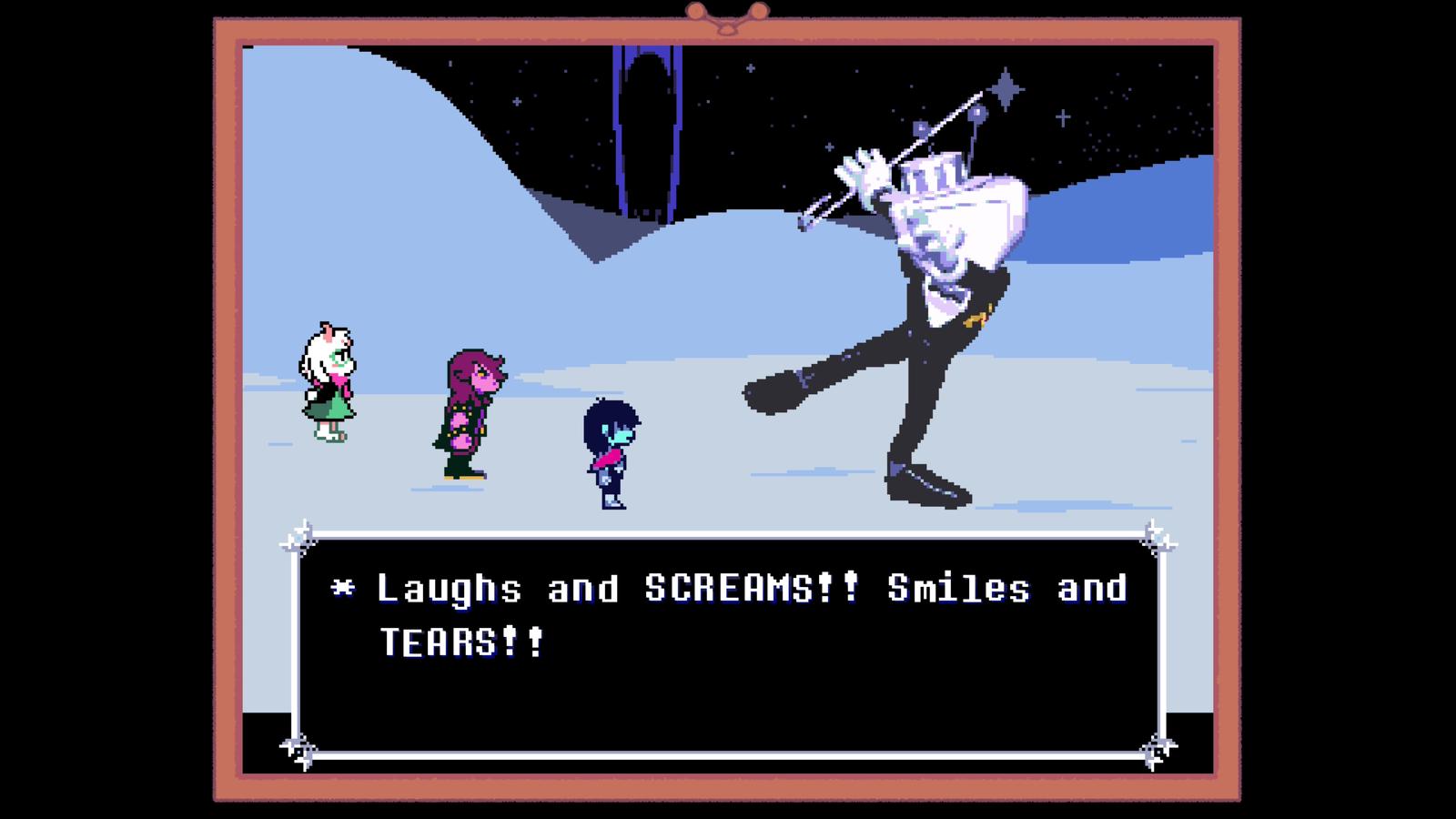
I can't sing Deltarune's praises loud enough. Toby Fox has created a refreshing witty, charming adventure that isn't afraid to be tongue-in-cheek and weird. At the same time, Deltarune's full of heart. Its emphasis is on the power of kindness and empathy for others, but its benevolent message is wrapped in a bizarre, coming-of-age RPG that is a joy to play.
There's no denying Undertale is the foundation upon which Deltarune is built, and the memorable pixelated gem Fox is building on that foundation is a stroke of genius. Keeping up that momentum across the next three chapters, however, will be the real challenge. And for fans like me, the years of waiting between them will be just as difficult.
Should I play Deltarune?
Play it if…
You love narrative-driven games with interesting characters
Deltarune has some of the best character development I've seen in a game. From the heroes themselves to the random enemy encounters, and bosses, every character is memorable and brimming with personality. If you want to sink your teeth into a story where the characters are the heart of the adventure, you can't go wrong here.
You want a lot of variety
Deltarune's four chapters offer unique characters, bosses, worlds, music, and mechanics, so if you want one game that almost feels like four different ones in a single package, it's well worth picking this up.
Don’t play it if…
You hate bullet hell games
As explained, the Bullet Board mechanic in Deltarune's encounters is tough to navigate. This is a bullet hell game, even if you take the path of kindness, so if you don't like that genre, or prefer unchallenging games, this may not be for you.
You don't want to wait for the whole story
Deltarune is an episodic RPG, consisting of seven chapters. Right now, only chapters one to four are available, with chapter five due to release in 2026 and the remaining chapters' release date TBC. If you want to play the entire thing at once, maybe hold off until every chapter has been released – though you'll be waiting a while.
Accessibility
Deltarune offers a few simple (but welcome) accessibility options. In the Config menu, you can select 'Controls' to remap the controls to a configuration best suited to your needs.
The Config menu also offers the ability to enable Auto-Run, which I advise for everyone. By default, Auto Run is toggled off, requiring you to hold the run button (B on Switch 2) to run. Kris moves slowly, but this can also prove tricky for those with dexterity issues. Enabling Auto Run means Kris runs everywhere without the need to hold the button.
I would have loved to see more accessibility options, especially for encounters. Some moves during encounters require you to quickly move the left toggle back and forth of the button bash, which proved especially challenging for me due to a recent wrist/thumb injury. The ability to hold a button or auto-complete these actions would be ideal.
How I reviewed Deltarune
I played Deltarune for 15 hours, with each of the four chapters taking around three to four hours to complete.
While I focused on the main story, I made sure to take the time to explore the game's various side routes where possible. Having previously completed Undertale, I was able to compare this game to Toby Fox's previous offering to give insight into the key similarities and differences between Deltarune and Undertale.
I reviewed Deltarune Chapters 1-4 on Nintendo Switch 2 with a Nintendo Switch 2 Pro controller, primarily playing in the console's TV mode with my Samsung Q80T QLED TV. I occasionally switched between the Pro and the Joy-Con 2 Charging Grip but found the Pro controller to be much more comfortable to use.
First reviewed June 2025
An award-winning games journalist, with seven years of experience in games journalism and a degree in journalism from City University, London, Vic brings experience from IGN, Eurogamer, The Telegraph, VG247, Dot Esports and more to the TechRadar table. You may have even heard her on the radio or speaking on a panel, as she’s previously appeared on BBC Radio 4, BBC Radio 5, BBC Radio Ulster and more. Not only is Vic passionate about games, but she's appeared on both panels and podcasts to discuss mental health awareness. Make sure to follow her on Twitter for more.
You must confirm your public display name before commenting
Please logout and then login again, you will then be prompted to enter your display name.
